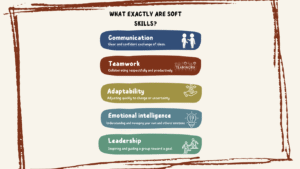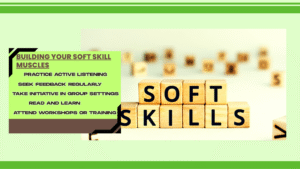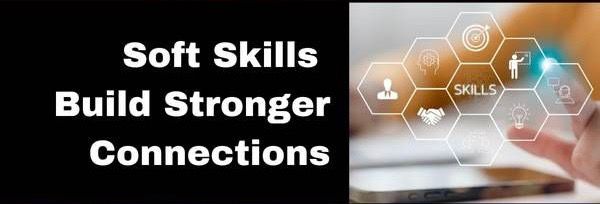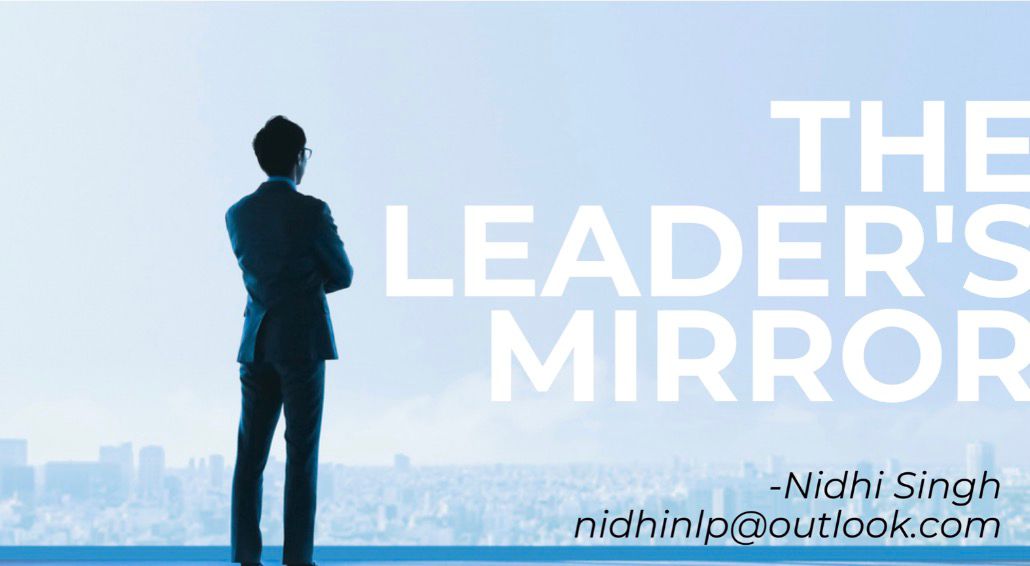Soft Skills: The Hidden Edge in Your Career Toolbox
Gone are the days when Soft Skills used to be optional; now they are a necessity.
In an increasingly competitive and collaborative work environment, your technical knowledge or hard skills, while important, are only half the story. According to the LinkedIn Global Talent Trends Report, 89% of bad hires typically lack soft skills rather than technical capabilities. Soft skills, such as communication skills, interpersonal skills, time management skills, and adaptability & flexibility, are now crucial ingredients for the recipe. This enables professionals to perform in complex workplace dynamics, build strong relationships, and foster collaboration. Employers value these skills because they enhance productivity, improve customer satisfaction, and contribute to a positive work culture. “Hard skills may get you hired, but soft skills will get you promoted.
What Exactly Are Soft Skills?
Soft skills are the non-technical attributes that influence how well you engage with others and manage your job. While hard skills are about your ability to perform specific tasks (like analysing data or coding), soft skills influence how you manage relationships, communicate, and solve problems.

Some of the most in-demand soft skills include:
- Communication: Clear and confident exchange of ideas.
- Teamwork: Collaborating respectfully and productively.
- Adaptability: Adjusting quickly to change or uncertainty.
- Emotional intelligence: Understanding and managing your own and others’ emotions.
- Leadership: Inspiring and guiding a group toward a goal.
These skills aren’t tied to a job title or industry—they’re essential everywhere.
75% of long-term job success depends on soft skills; only 25% depends on technical knowledge.
— Stanford Research Institute and Carnegie Mellon Foundation
Why Soft Skills Matter More Than Ever
According to a LinkedIn Global Talent Trends report, 92% of hiring managers say soft skills are just as important—or more important—than hard skills. Why? Because businesses no longer operate in silos. Teams are cross-functional, meetings are remote, and change is constant. Success depends not only on what you do, but also on how you do it.
” Many organisations now prioritise soft skills during the hiring process, recognising that they are essential for leadership, teamwork, and long-term success. Developing these skills can set you apart in your career, enabling you to overcome challenges, communicate effectively, and adapt to change with resilience and confidence. These skills are not only beneficial for individual growth but also for the success of the organisation as a whole. By stimulating a culture that values soft skills, companies can create a more engaged, collaborative, and innovative workforce. Beyond personal advancement, these skills are pivotal for organisational success. Cultivating a culture that prioritises soft skills empowers businesses to develop a more dedicated, cooperative, and creative workforce. The entire entity benefits when soft skills are emphasised alongside traditional qualifications. Distinct from hard skills, which are technical and role-specific, soft skills possess the advantage of being adaptable and broadly applicable across diverse sectors.
Building Your Soft Skill Muscles

The good news? Soft skills can be developed, just like any other skill. Here are some simple ways to start:
Companies that invest in soft skills training see a 12% increase in productivity and a 250% return on investment.
— Boston College, Harvard University & University of Michigan Study
- Practice active listening
In conversations, focus entirely on the speaker. Avoid interrupting and reflect on what you heard.
- Avoid distractions, such as your phone or mentally preparing your reply while they speak.
- Use verbal and nonverbal cues, such as nodding or saying “I see,” to show engagement.
- Reflect what you heard: “So what you’re saying is…
Why it matters: Listening well improves trust, prevents misunderstandings, and strengthens relationships at work.
- Seek feedback regularly
Ask peers or mentors about your communication style, teamwork, or leadership behavior.
- Ask a colleague after a meeting: “Was I clear? Anything I could improve?”
- Request 360-degree feedback from your manager, team, or even clients.
Why it matters: Self-awareness is the foundation of emotional intelligence. Feedback shows you care about how your actions affect others.
- Take initiative in group settings
Opportunities to lead or collaborate are everywhere.
- Volunteer to organize a meeting, facilitate a brainstorming session, or mediate a conflict.
- Support a quiet teammate or help a new joiner feel included.
Why it matters: Taking initiative builds leadership, communication, and problem-solving skills—all key components of strong soft skills.
- Read and learn
Books, podcasts, and TED Talks are great ways to develop insights and language around interpersonal effectiveness.
- Recommended reads:
- “Emotional Intelligence” by Daniel Goleman
- “Crucial Conversations” by Patterson, Grenny, McMillan & Switzler
- Podcasts like The Look & Sound of Leadership by Tom Henschel
Why it matters: Learning from experts helps you understand the “why” behind behaviours—and gives you strategies to respond better in real time.
- Attend workshops or training
Formal training helps you role-play scenarios, receive coaching, and build skills in a safe space.
- Look for sessions on public speaking, conflict resolution, empathy, stress management, or negotiation.
- If your company doesn’t offer these, explore online platforms like Coursera, Udemy, or LinkedIn Learning.
Why it matters: Structured learning allows you to practice soft skills deliberately, not just rely on experience alone.
Final Thoughts: Invest in the Invisible Skills
In a world driven by people and relationships, these invisible skills are your strongest competitive edge.
So, take a moment to ask yourself:
Am I easy to work with? Do I communicate clearly? Can I handle stress and change gracefully?
If you can answer “yes” to those questions—or are willing to work toward them—you’re already investing in your future.





Leave a Reply